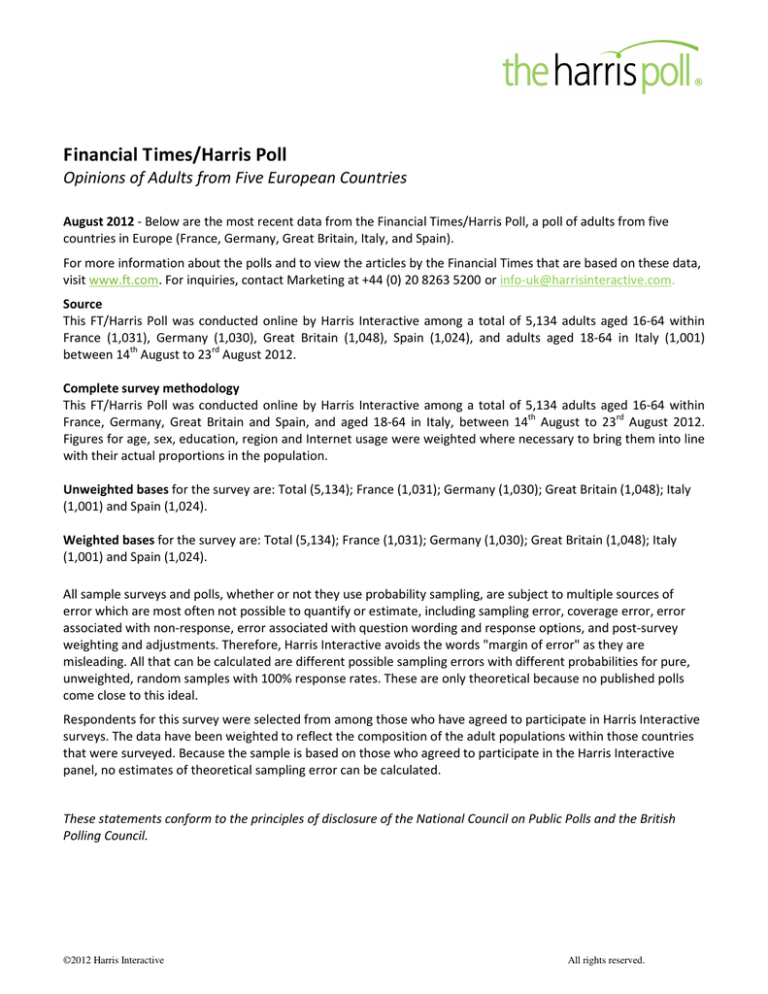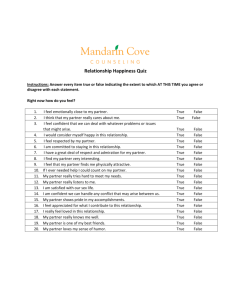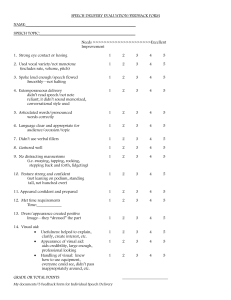
Financial Times/Harris Poll
Opinions of Adults from Five European Countries
August 2012 - Below are the most recent data from the Financial Times/Harris Poll, a poll of adults from five
countries in Europe (France, Germany, Great Britain, Italy, and Spain).
For more information about the polls and to view the articles by the Financial Times that are based on these data,
visit www.ft.com. For inquiries, contact Marketing at +44 (0) 20 8263 5200 or info-uk@harrisinteractive.com.
Source
This FT/Harris Poll was conducted online by Harris Interactive among a total of 5,134 adults aged 16-64 within
France (1,031), Germany (1,030), Great Britain (1,048), Spain (1,024), and adults aged 18-64 in Italy (1,001)
between 14th August to 23rd August 2012.
Complete survey methodology
This FT/Harris Poll was conducted online by Harris Interactive among a total of 5,134 adults aged 16-64 within
France, Germany, Great Britain and Spain, and aged 18-64 in Italy, between 14th August to 23rd August 2012.
Figures for age, sex, education, region and Internet usage were weighted where necessary to bring them into line
with their actual proportions in the population.
Unweighted bases for the survey are: Total (5,134); France (1,031); Germany (1,030); Great Britain (1,048); Italy
(1,001) and Spain (1,024).
Weighted bases for the survey are: Total (5,134); France (1,031); Germany (1,030); Great Britain (1,048); Italy
(1,001) and Spain (1,024).
All sample surveys and polls, whether or not they use probability sampling, are subject to multiple sources of
error which are most often not possible to quantify or estimate, including sampling error, coverage error, error
associated with non-response, error associated with question wording and response options, and post-survey
weighting and adjustments. Therefore, Harris Interactive avoids the words "margin of error" as they are
misleading. All that can be calculated are different possible sampling errors with different probabilities for pure,
unweighted, random samples with 100% response rates. These are only theoretical because no published polls
come close to this ideal.
Respondents for this survey were selected from among those who have agreed to participate in Harris Interactive
surveys. The data have been weighted to reflect the composition of the adult populations within those countries
that were surveyed. Because the sample is based on those who agreed to participate in the Harris Interactive
panel, no estimates of theoretical sampling error can be calculated.
These statements conform to the principles of disclosure of the National Council on Public Polls and the British
Polling Council.
©2012 Harris Interactive
All rights reserved.
TABLE 1
GREEK EXIT
“As it currently stands, do you believe that Greece should remain a member of the eurozone?”
Base: All EU adults in five countries
Great
Britain
%
1048
France
Italy
Spain
Germany
%
1031
%
1001
%
1024
%
1030
Yes
24%
39%
No
33%
32%
Not sure
43%
29%
Note: Percentages may not add up to 100% due to rounding
59%
21%
20%
45%
27%
28%
27%
54%
19%
Unweighted base
The Spaniards and Italians – and to a lesser extent, the French – are significantly more likely to believe that Greece
should remain a member of the eurozone than their British and German counterparts. The Italians are the most
supportive (59% believe Greece should remain a member), whist the Germans are the less sympathetic (54%
believe it should not).
2
TABLE 2
HELP TO GREECE
“Some argue that other eurozone members should do more to help Greece remain in the eurozone.
To what extent do you agree or disagree with this view?”
Base: All EU adults in five countries
Great
Britain
%
1048
France
Italy
Spain
Germany
%
1031
%
1001
%
1024
%
1030
Agree (NET)
21%
25%
Strongly agree
6%
5%
Somewhat agree
15%
20%
Neither agree nor disagree
42%
33%
Disagree (NET)
37%
43%
Somewhat disagree
24%
25%
Strongly disagree
13%
18%
Note: Percentages may not add up to 100% due to rounding
43%
11%
32%
30%
27%
17%
10%
46%
20%
26%
30%
24%
12%
11%
26%
7%
18%
28%
47%
22%
25%
Unweighted base
Again, the Spaniards and Italians agree to a greater extent that more should be done to help Greece remain in the
eurozone (46% and 43% agree respectively). In comparison, the Germans, French and Britons are significantly
more inclined to disagree. As much as 47% of Germans disagree that more should be done to help.
3
TABLE 3
CONFIDENCE IN EUROPE’S AND GREECE’S ABILITY TO OVERCOME THE DEBT CRISIS
“How confident are you, if at all, that…?”
Greece will ever repay its bailout loans.
Base: All EU adults in five countries
Unweighted base
At least somewhat confident
(NET)
Very/Extremely confident (NET)
Extremely confident
Very confident
Confident
Somewhat confident
Not at all confident
Great
Britain
%
1048
33%
5%
2%
3%
10%
18%
67%
France
Italy
Spain
Germany
%
1031
%
1001
%
1024
%
1030
36%
1%
0
1%
12%
22%
64%
77%
4%
1%
3%
19%
54%
23%
57%
4%
1%
3%
21%
32%
43%
26%
3%
0
2%
9%
15%
74%
Note: Percentages may not add up to 100% due to rounding
5% or less of Europeans in the countries surveyed strongly believe that Greece will ever repay its bailout loans.
The vast majority of Germans, Britons and French are not at all confident that it will ever be repaid. Although a
majority of Italians and Spaniards believe that it will be repaid, only 4% go as far as saying that they are
very/extremely confident about it.
Greece will reform its economy to ensure that it does not need EU financial support in the future.
Base: All EU adults in five countries
Unweighted base
At least somewhat confident
(NET)
Very/Extremely confident (NET)
Extremely confident
Very confident
Confident
Somewhat confident
Not at all confident
Great
Britain
%
1048
44%
5%
2%
3%
11%
28%
56%
Note: Percentages may not add up to 100% due to rounding
4
France
Italy
Spain
Germany
%
1031
%
1001
%
1024
%
1030
50%
3%
1%
2%
14%
34%
50%
88%
6%
2%
4%
31%
50%
12%
70%
6%
1%
4%
28%
37%
30%
51%
4%
1%
3%
16%
31%
49%
The same picture applies to the likelihood that Greece will be able to reform its economy to ensure that it does
not need EU financial support in the future. The Britons, French and Germans are by large pessimistic, and
although a majority of Italians and Spaniards are at least somewhat confident that Greece will be able to reform,
very few strongly believe it.
Eurozone policy-makers will address the debt crisis in the eurozone.
Base: All EU adults in five countries
Unweighted base
At least somewhat confident
(NET)
Very/Extremely confident (NET)
Extremely confident
Very confident
Confident
Somewhat confident
Not at all confident
Great
Britain
%
1048
56%
7%
2%
5%
15%
34%
44%
France
Italy
Spain
Germany
%
1031
%
1001
%
1024
%
1030
69%
4%
1%
3%
25%
40%
31%
83%
9%
3%
6%
33%
42%
17%
63%
7%
2%
5%
20%
36%
37%
70%
10%
2%
8%
24%
37%
30%
Note: Percentages may not add up to 100% due to rounding
The majority of Europeans in the countries surveyed at least some confidence that the eurozone policy-makers
will address the debt crisis in the eurozone – the most confident being the Italians (with a mean score of 2.36),
and perhaps surprisingly the Germans (with a mean score of 2.17).
5
TABLE 4
IMPACT OF AUSTERITY MEASURES
“What impact do you believe austerity measures have on solving the debt crisis in Europe, if any?”
Base: All EU adults in five countries and U.S. adults
Great
Britain
%
Unweighted base
1048
France
Italy
Spain
Germany
%
1031
%
1001
%
1024
%
1030
Positive impact (NET)
25%
14%
Very positive impact
3%
2%
Somewhat positive impact
21%
12%
No impact
26%
11%
Negative impact (NET)
29%
61%
Somewhat negative impact
19%
35%
Very negative impact
10%
26%
Not sure
20%
14%
Note: Percentages may not add up to 100% due to rounding
17%
1%
16%
11%
62%
42%
20%
10%
19%
4%
15%
11%
64%
24%
40%
6%
20%
1%
18%
12%
58%
43%
15%
10%
The majority of Spaniards, Italians, French and Germans believe that austerity measures have a negative impact
on solving the debt crisis in Europe. The Britons are only slightly more likely to believe that they have a negative
impact rather than positive one (29% vs. 25%), but are noticeably more unsure about their impact than their
other European counterparts.
6
About Harris Interactive
Harris Interactive is one of the world’s leading custom market research firms, leveraging research, technology,
and business acumen to transform relevant insight into actionable foresight. Known widely for the Harris Poll and
for pioneering innovative research methodologies, Harris offers expertise in a wide range of industries including
healthcare, technology, public affairs, energy, telecommunications, financial services, insurance, media, retail,
restaurant, and consumer package goods. Serving clients in over 215 countries and territories through our North
American, European, and Asian offices and a network of independent market research firms, Harris specializes in
delivering research solutions that help us – and our clients – stay ahead of what’s next. For more information,
please visit www.harrisinteractive.com.
7








